Take Your Pick
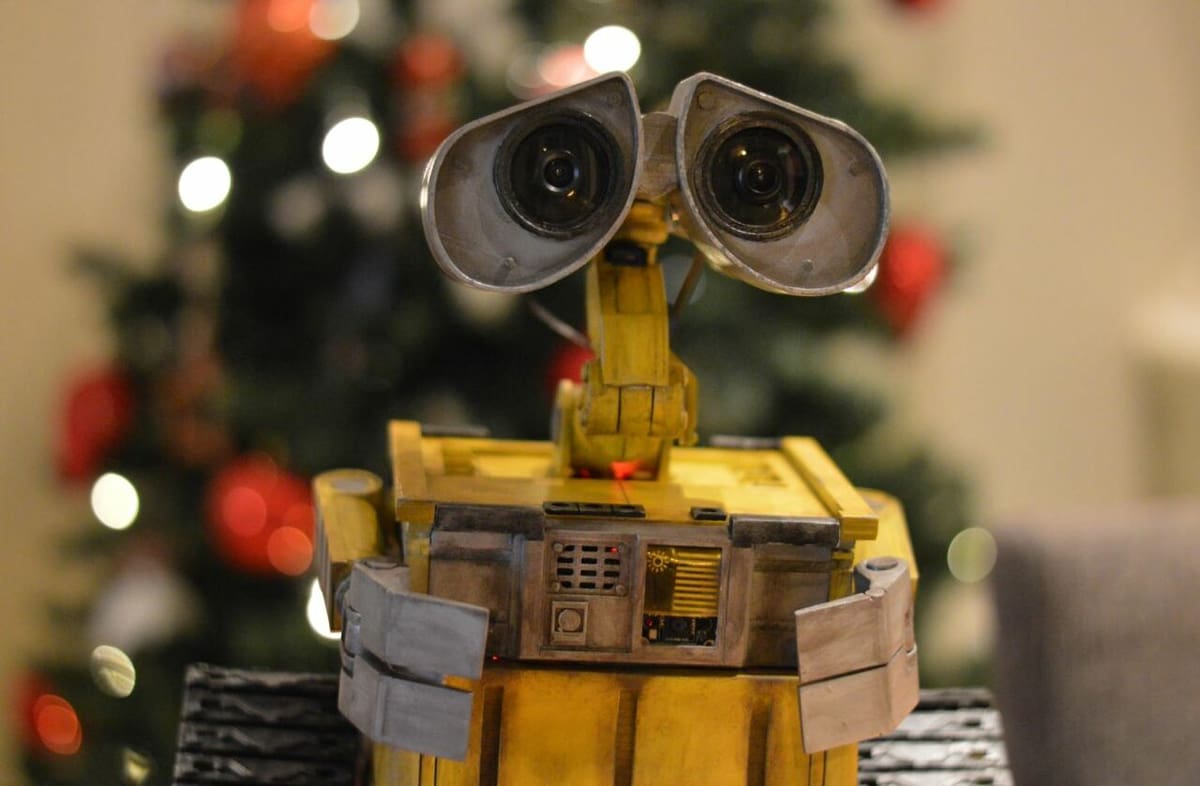
If you don’t know who WALL-E is, he’s a curious robot from the movie WALL-E. In the world of the film, humans have moved on from Earth to live in space, leaving behind robots like WALL-E (waste allocation load lifter – Earth-class) to clean up the trashed planet Earth, and sending robots like EVE (extraterrestrial vegetation evaluator) to look for signs of life.
In this article, we’ll be listing our 10 favorite WALL-E robots that use 3D printed parts along with other hardware to move around and function. We’ve found six easy designs and four more complex ones; the complex ones might not have available files or instructions but you can use them as inspiration!
If you see a WALL-E that you want to get the 3D parts for but don’t have the setup to print them yourself, try Craftcloud. With a wide range of materials and finishes, your cute WALL-E’s parts can be on their way to you in no time.
Before we get to the list though, you might want to see which parts you’re likely to need.
Materials
In addition to the motors and hardware that your WALL-E will need to work, these projects all require a good bit of 3D printing. Make sure you’re all loaded up on filament before getting started.
Robots also use a single-board computer or microcontroller to be controlled and programmed, so having a Raspberry Pi or Arduino on hand is a good idea. Other electronic and hardware components vary for each robot but may include some screws, nuts, servos, motors, and sensors.
Easy Prints and Projects
All of these WALL-Es will come together pretty easily. Materials and instructions are included!
Micro:Bit
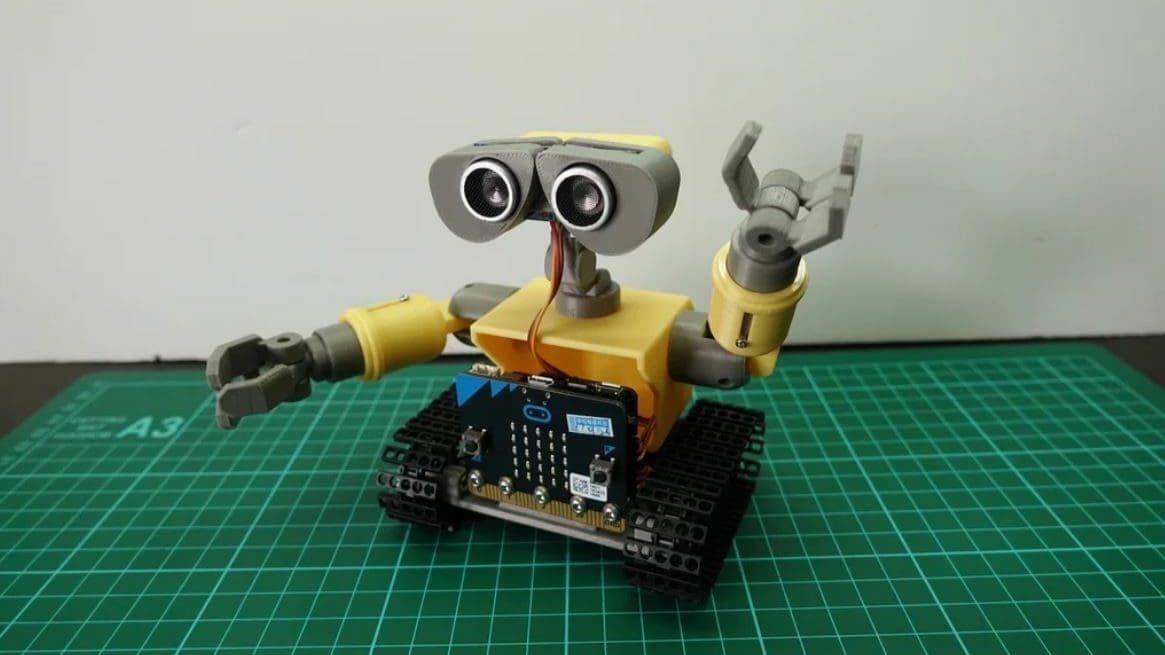
To start off this WALL-E list, we’ve got a robot that uses 3D printed parts, electronic components, Lego parts, and a Micro:Bit. In addition, you’ll need two servos, a sensor, some screws, and more to complete it. Check out the project page for the full bill of materials.
The designer recommends printing the parts in PLA with 10% infill and supports. The project’s GitHub should also really help you with assembly and to find all the necessary files.
- Who designed it? ShinWeiChiou
- How popular/printable is it? This project has 2 Remixes and about 4,000 downloads.
- Where to find it? Thingiverse
SCRU-FE
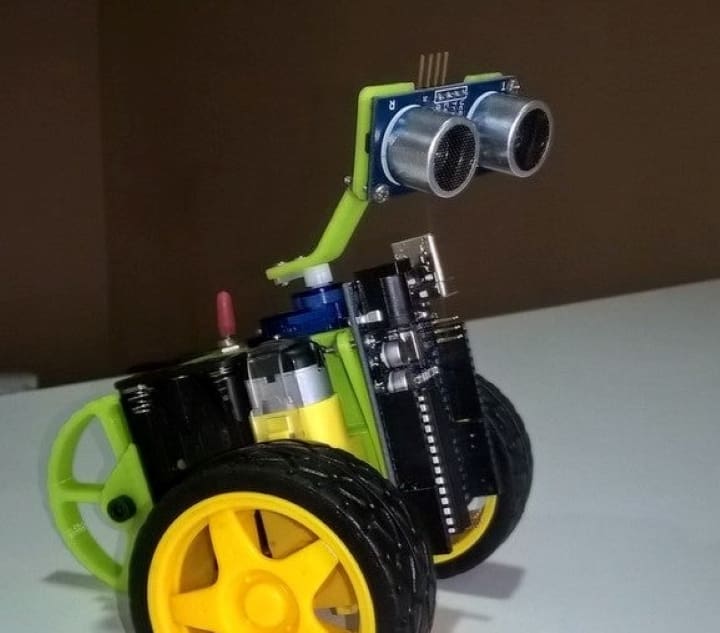
This design is a WALL-E-themed SCRU-FE, which stands for simple C++ robot with ultrasonic sensor for education – quite a mouthful! The design includes a motor shield and an HC-SR04 ultrasonic sensor, and you’ll need seven 3D printed parts.
The full list of materials for this project can be found on the project page but includes bearings, washers, a power supply unit, AAA batteries, and an Arduino Uno.
- Who designed it? blue_17
- How popular/printable is it? This project has over 1,700 downloads!
- Where to find it? Thingiverse
Arduino
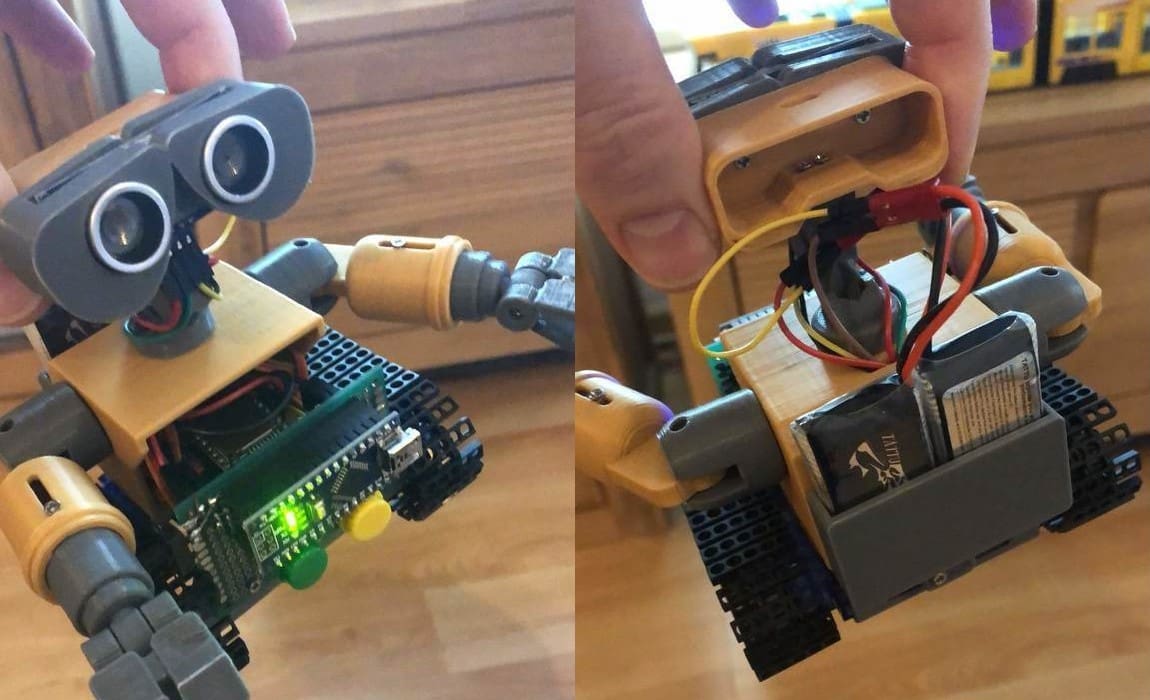
This WALL-E model robot uses an Arduino and some 3D printed parts to work and move around. The robot runs on C++ and the program files can be found on the project’s GitHub repository.
The designer has updated the robot and added a DFPlayer (speaker) to make it talk, and it’s powered by two drone batteries. This one is truly tiny, and truly adorable!
Robotics Kit Costume
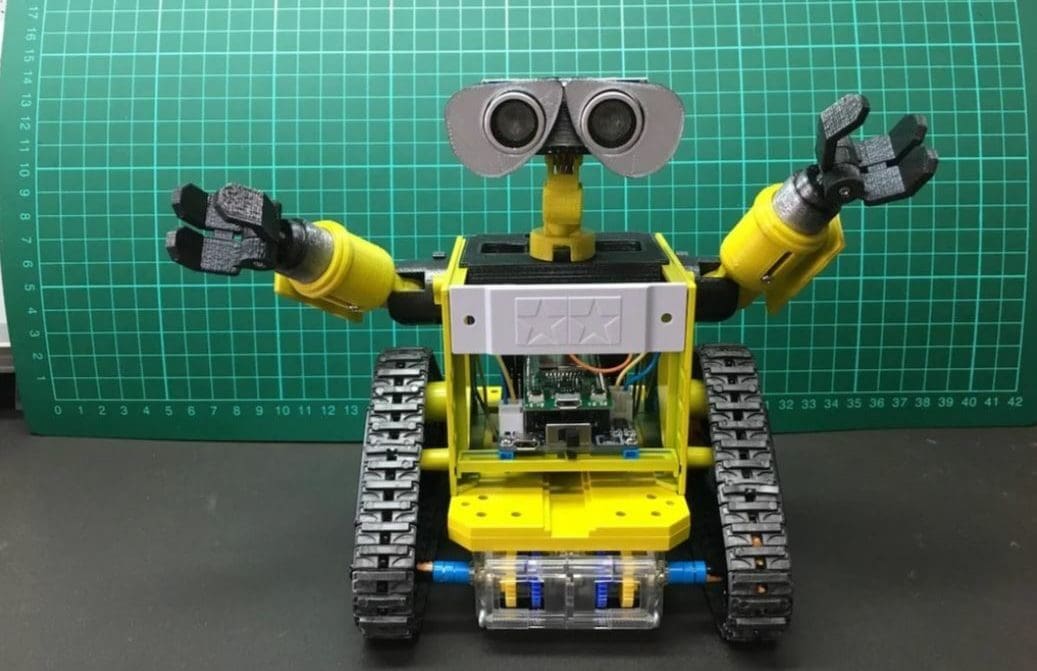
This design dresses up an existing robot kit to look like WALL-E! The project uses the kit, some 3D printed parts, some servos, and some other hardware. The 3D printed parts were designed in Rhino and the firmware was coded in Arduino IDE.
The creator of this project listed the needed materials on the project page which include a Robot Shield, three SG90 servos, an HC-SR04P ultrasonic sensor, some M2 screws, and of course the 3D printed cover. Assembly instructions can be found on the designer’s YouTube guide.
Another maker posted an impressive Make that they printed with a 0.2-mm layer height, 20% infill, and no supports.
- Who designed it? ShinWeiChiou
- How popular/printable is it? This project has 2 recorded Makes and over 5,400 downloads!
- Where to find it? Thingiverse
TinyTrax

This robot uses first-person view (FPV) so that the driver can see everything the robot sees while moving. This design is a Remix of a WALL-E statue, with new treads for mini FPV RC control.
There are 19 different 3D printable parts that this project uses to function and move around. Watch it go!
- Who designed it? Smegedd
- How popular/printable is it? This project has over 900 downloads.
- Where to find it? Thingiverse
Pololu Zumo Cover
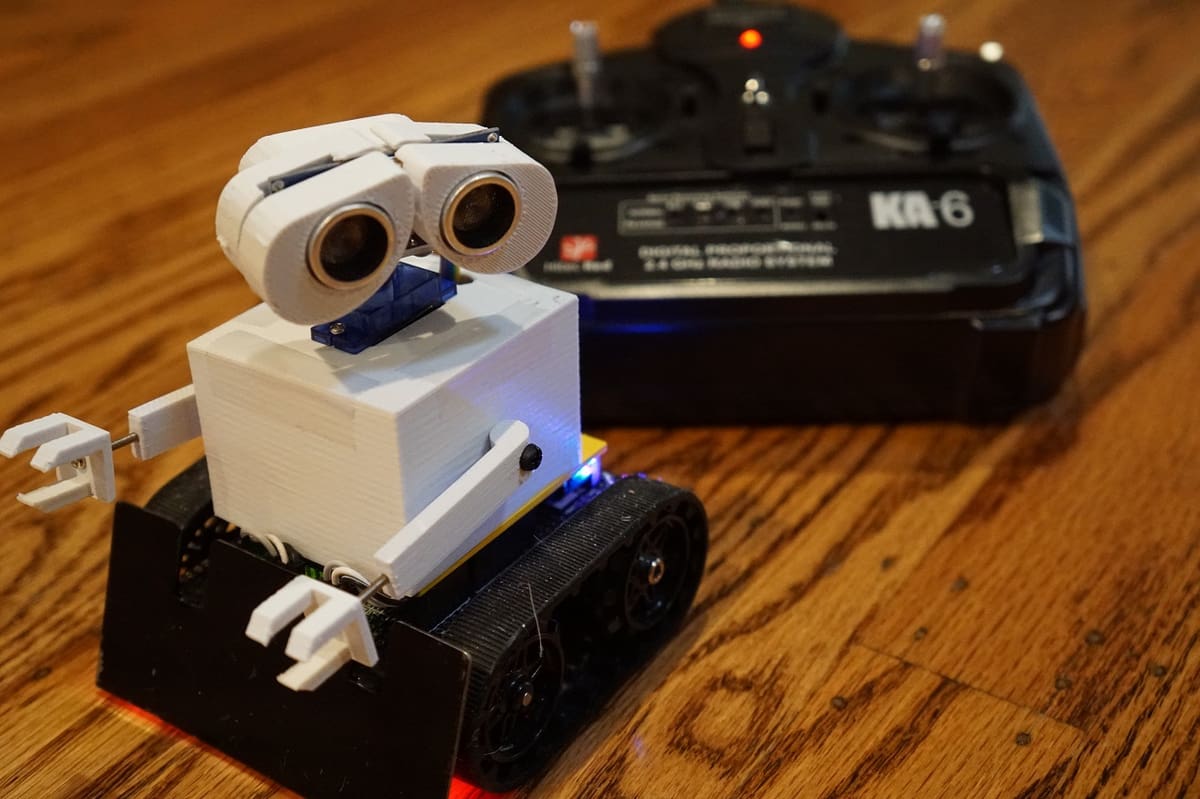
This project isn’t a full robot, but a WALL-E “costume” for a Pololu Zumo chassis. The chassis is used as the base, along with seven different 3D printable parts that make up the WALL-E “cover”. If you want to make any changes to the design, the OpenSCAD files are included.
The creator didn’t list any printing advice, but another maker posted a spectacular model, seen above. They listed that they printed the parts with a raft but no supports on an Afinia H480.
- Who designed it? felixstdp
- How popular/printable is it? This project has 1 recorded Make as well as over 2,900 downloads.
- Where to find it? Thingiverse
Hard Prints and Projects
The following projects take WALL-E to the next level! Check out what’s possible.
Camera

This detailed WALL-E robot uses many electronic parts including 12 V motors, a camera, and an SBC. Seven independent servos are needed for WALL-E to move his “feet”, neck, arms, eyes, and head. It’s designed so you can see out of WALL-E’s eyes.
The designer posted three videos that go over post-processing, assembly, and electronics to bring this WALL-E to life. However, their Thingiverse page is no longer online, so sadly the model files aren’t currently available.
Two Ways
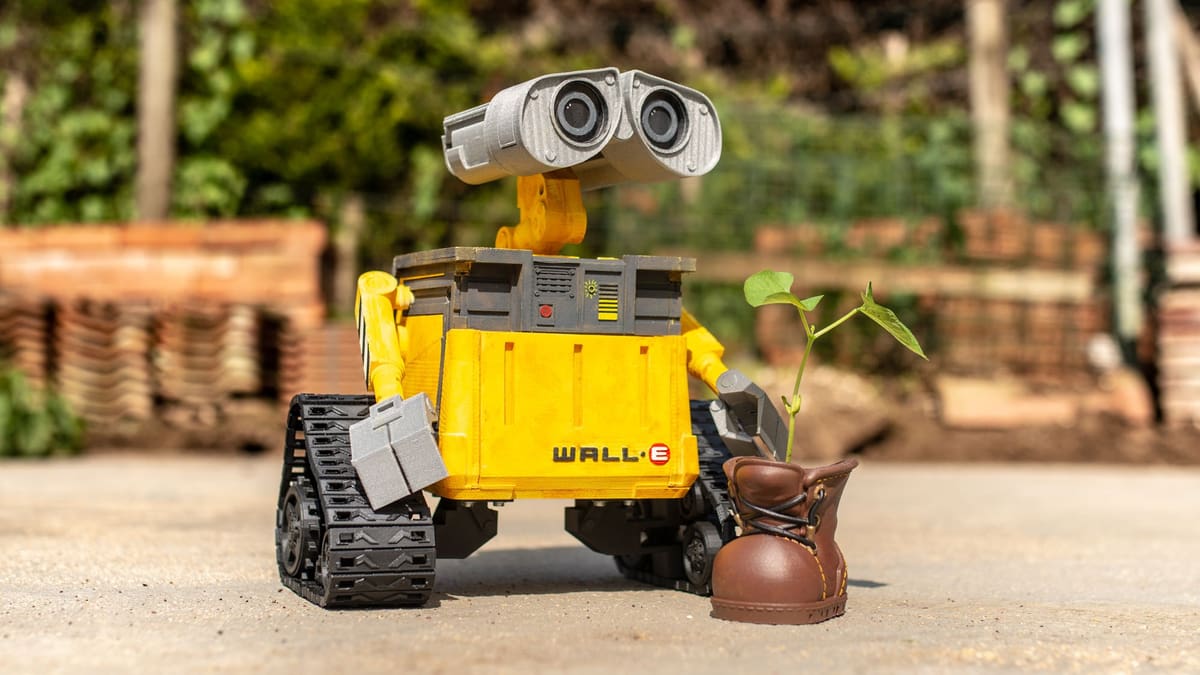
This is a WALL-E with a ton of visual detail. There are two versions, one that’s designed for accuracy but can’t move around, and one that’s equipped to add electronics (though the designer didn’t have powerful enough motors for it to actually move). In total, for the electronic version, you need over 300 3D printed parts!
If you want to try to get it moving, the robot uses a variety of different electronic components and other hardware. The full list of materials can be found on the project page and includes an Arduino Uno, sub-micro servos, and DC motors.
A community maker posted a great print and listed what they used: PLA with a 15%-25% infill, a 0.2-mm layer height, and a print speed of 55 mm/s. There was a lot of post-processing done to match the robot’s appearance in the film, and it shows. You can watch the full creation process in the designer’s YouTube video, or see a full timelapse of all the parts printing!
- Who designed it? ChaosCoreTech
- How popular/printable is it? This project has over 30,000 views and 5,000 downloads!
- Where to find it? MyMiniFactory
Replica
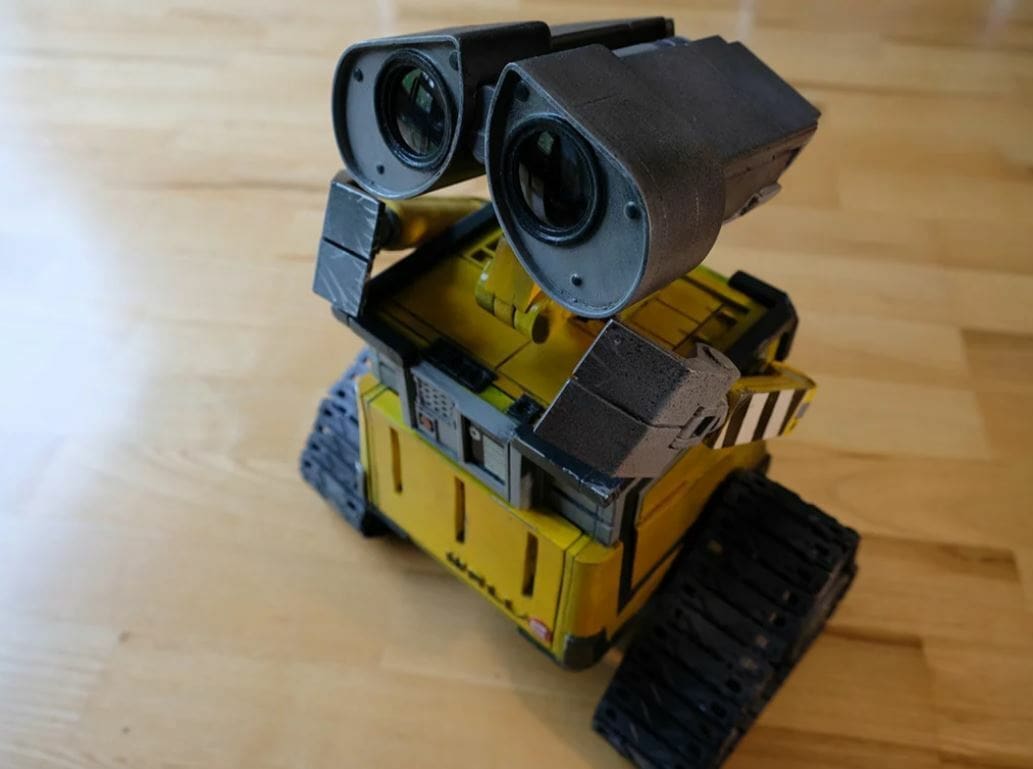
This model is definitely a little more complicated than some of the other ones on the list, and also has a ton of detail. Numerous servos are used to move certain parts, and it’s equipped with multiple cameras.
The full bill of materials for this WALL-E used can be found on the designer’s website and GitHub but includes servos, M3 bolts, screws, nuts, a battery pack, and a Raspberry Pi. The design has been updated multiple times to improve functionality. There’s a video detailing the full assembly if you want to try it yourself.
For the 3D printed parts, it’s suggested to use PLA with a standard 0.2-mm layer height, 15% infill, and supports activated.
- Who designed it? chillibasket
- How popular/printable is it? This project has 38 recorded Makes, 19 Remixes, hundreds of comments, and over 155,000 downloads: Wow!
- Where to find it? Thingiverse
Tele-responsive
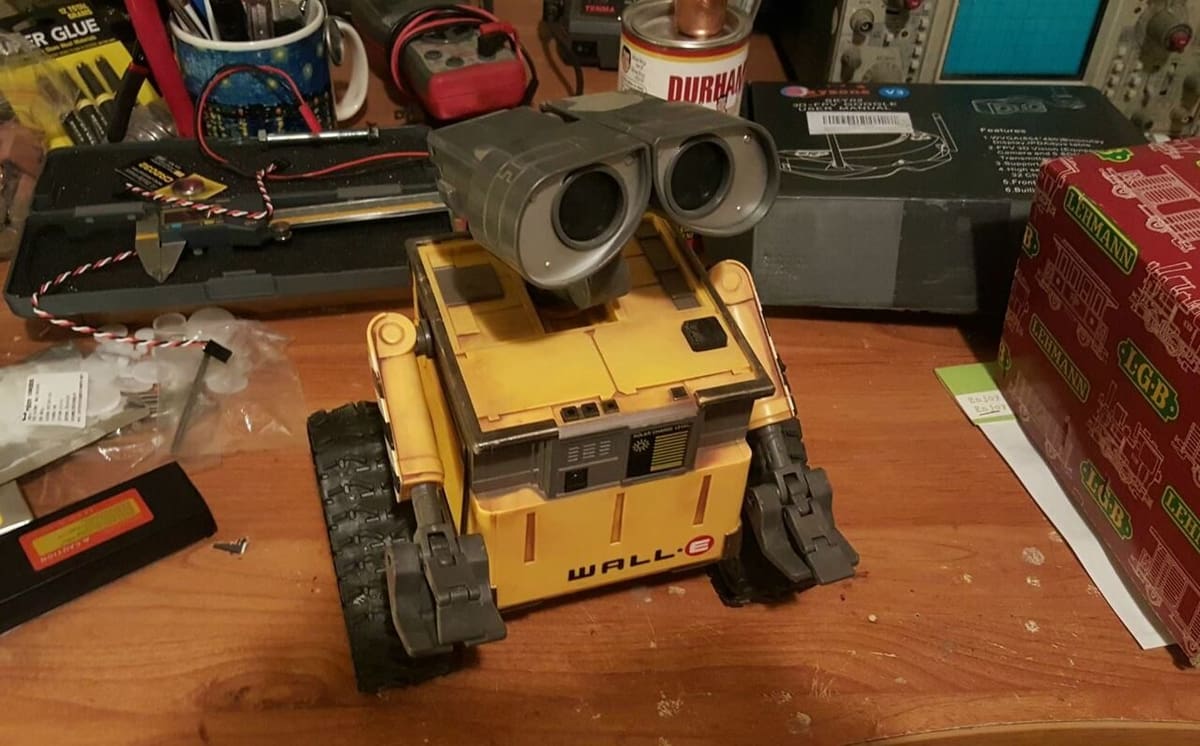
This project takes a remote-controlled WALL-E toy and adds 3D printed parts to make it into a telepresence rover. The completed robot is teleresponsive (controlled through sound commands) and strong enough to hold up a screen!
For this impressive build, the maker added a Raspberry Pi, double gearbox, TFT touchscreen display, webcam, and more. Unfortunately, the 3D printable parts weren’t published by the maker, so you’ll just have to admire this specced-up WALL-E from afar.
- Who designed it? amaurer3210
- How popular/printable is it? This project has over 2,900 upvotes on Reddit!
- Where to find it? Reddit
Lead image source: jasonleung8866 via Thingiverse
License: The text of "WALL-E 3D Printed Robot: 10 Great Models & Projects" by All3DP is licensed under a Creative Commons Attribution 4.0 International License.